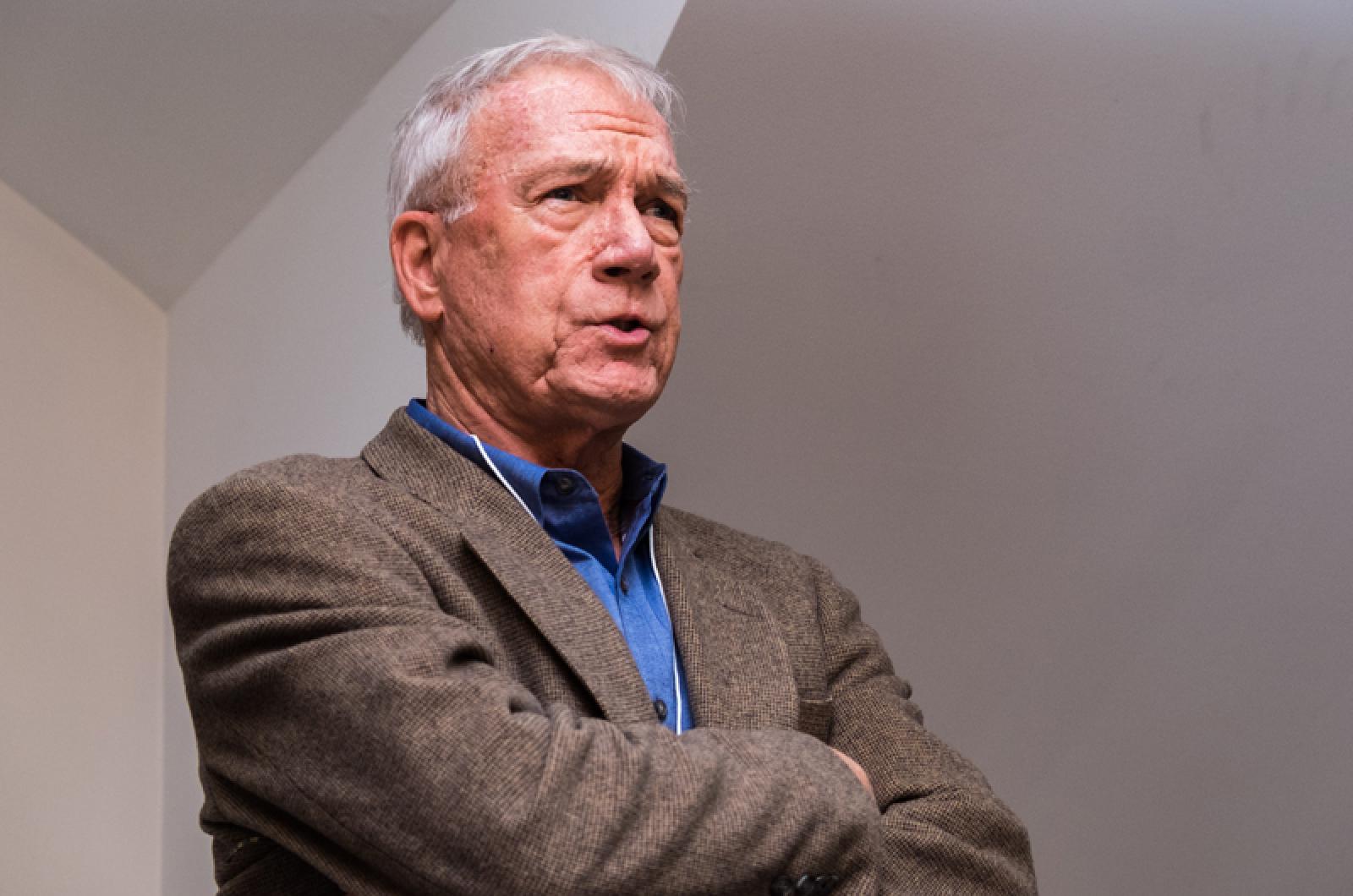Walter Robinson, the Boston Globe editor who led the paper’s Pulitzer Prize-winning coverage of child sexual abuse by Catholic priests, has always shunned notoriety.
“The fact that nobody knows who I am is a good thing as a reporter,” Mr. Robinson said, speaking before a sold-out crowd of more than 55 guests at the Vineyard Gazette’s Tuesdays in the Newsroom event this week.
“That’s all changed,” he said.
Mr. Robinson, who was born on Martha’s Vineyard but raised in Boston began his newspaper career at the Globe in 1972, while he was still a Northeastern University student. He has been the Globe’s city editor, metro editor, White House correspondent and foreign correspondent, and is now the editor at large. From 1999 to 2006, he led the newspaper’s Spotlight team of four investigative reporters.
But to his regret, he has done precious little newspapering in the past six months. Instead he has been advising filmmakers and helping to promote the movie Spotlight, the story of the nuts and bolts newspaper work by the Globe investigative team that led to front page stories which reverberated around the world.
Mr. Robinson said the film, with a $20 million budget, paltry by Hollywood standards, almost didn’t get made. It only got a green light when actors Mark Ruffalo, Michael Keaton and Rachel McAdams read the script and agreed to work for union scale or minimum wage for actors. In the film, Mr. Robinson is played by Mr. Keaton, who not only looks remarkably like his real life counterpart, but managed to capture his speech and mannerisms, after spending time prior to shooting the scenes.
The film has far exceeded the Spotlight team’s expectations.
“We thought maybe it would play at the Kendall Square Theater for a week and then go to video,” Mr. Robinson told the newsroom gathering.
As he said, that’s all changed.
Spotlight has grossed nearly $50 million since opening Nov. 8 and is nominated for six Oscars, including best picture.
The audience asked questions about several of the most gripping scenes in the film. Mr. Robinson said some of those scenes never happened, and others didn’t happen exactly as depicted on screen. But he said the screenwriters and actors did a remarkable job of capturing the essence of the dramatic story behind the dramatic newspaper report.
“It does capture with amazing accuracy what we did, how we did it, how we did our reporting, and really captures almost all of the personalities and how they interacted at the Globe,” Mr. Robinson said. “It’s about faith, and the down side to blind faith. It’s about our children. It’s about all of our collective responsibility to the world around us, and how we sometimes, not just reporters, not just prosecutors and police, but how all of us walk by injustices all the time and either don’t see them, or see them and don’t pay them any account.”
The movie depicts some of the conflict the Spotlight team reporters experienced while under pressure from the Catholic archdiocese, as well as their colleagues and even their families. He said all the reporters were raised in Catholic families, but were no longer deeply involved in the church at the time they were reporting the story.
“The story was emotionally distressing on many levels,” Mr. Robinson said. “We were really angry, and our anger really drove us.”
Since his anonymity is blown, Mr. Robinson views his newfound notoriety as an opportunity to advocate for print journalism.
“At most daily newspapers, investigative reporting is a thing of the past,” he said. “I think editors and publishers have made a lot of mistakes since the dawn of the Internet. I think one of the mistakes editors have made is where they cut resources.”
He noted that the Boston Globe has cut all its foreign bureaus and laid off or bought out many of its most experienced news reporters. According to Mr. Robinson, the newspaper had 550 people on its news staff in 1999. Today the paper has a little more than 300 people. He said that is still a better situation than many large city papers, which have fewer than 200 people on the news staff.
He said there are plenty of stories yet to be written, but fewer and fewer people to write them.
“Many newspapers now, it’s just not being done at all,” Mr. Robinson said. “For every story you tackle, there are nine stories on the wait list. We could have ten Spotlight teams. If a few young people decide to make journalism a career because of this film, that’s good,” he said.
“The pay is horrible, but it’s just a hell of a lot of fun.”
The Gazette Tuesdays in the Newsroom series continues through the winter. Information about the March event will be publicized in print and on the Gazette website in the weeks ahead.







Comments (7)
Comments
Comment policy »